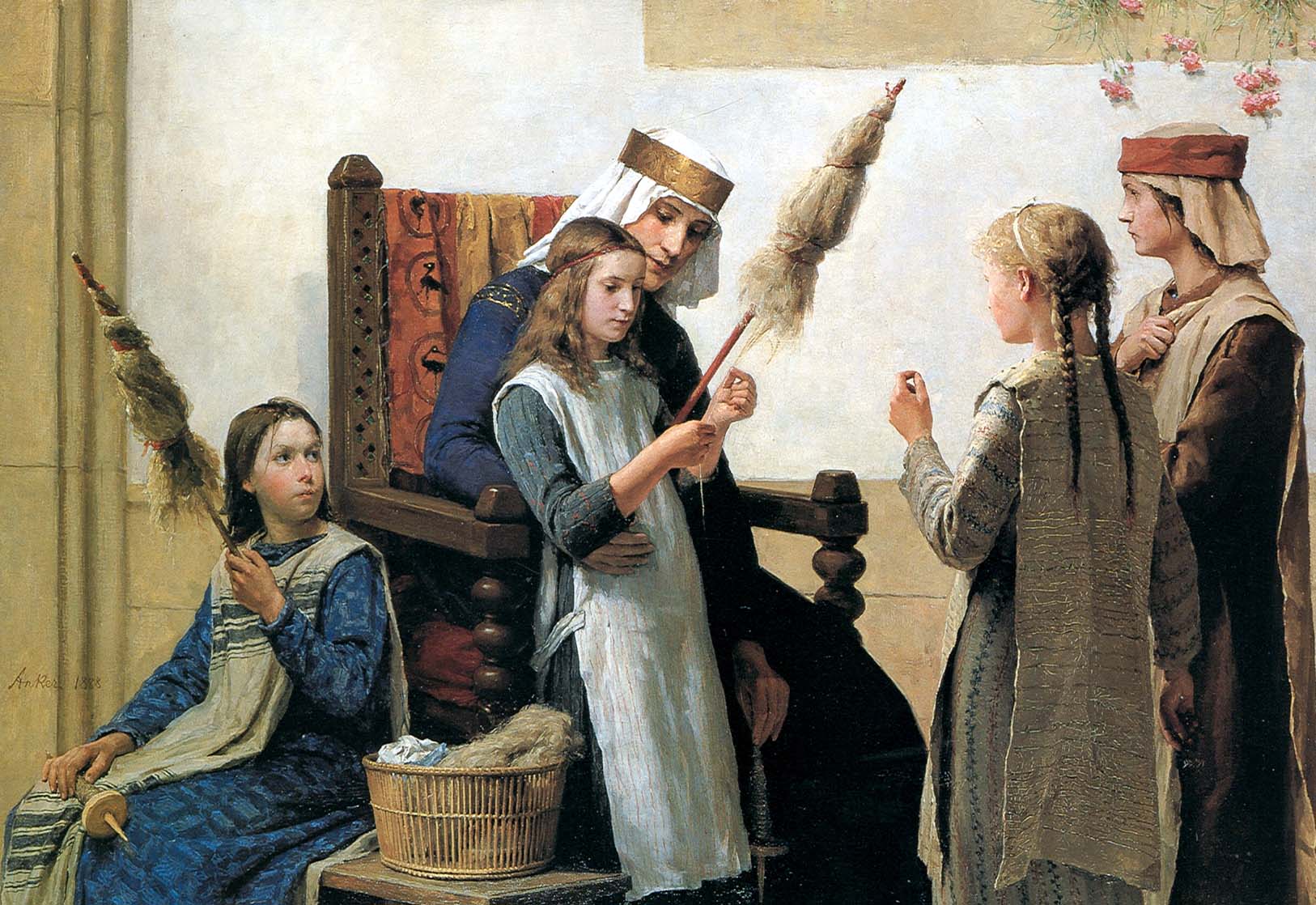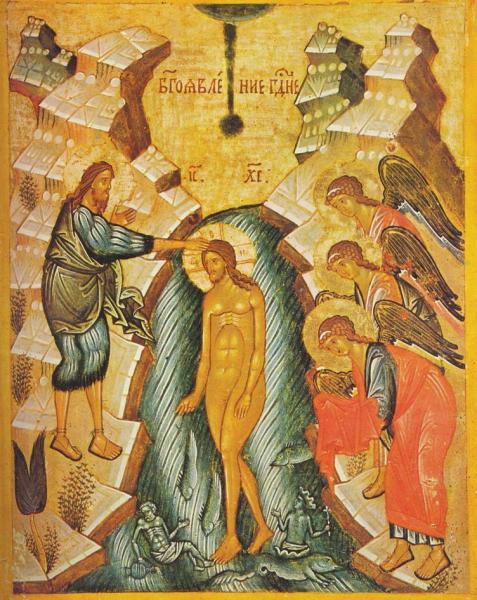|
Distaff Day
Distaff Day, also called Roc Day or Rock Day, is 7 January, the day after the feast of the Epiphany. It is also known as Saint Distaff's Day, one of the many unofficial holidays in Catholic nations. The distaff, or roc, used in spinning was the medieval symbol of women's work. In many European cultural traditions, women resumed their household work after the twelve days of Christmas. Women of all classes would spend their evenings spinning on the wheel. During the day, they would carry a drop spindle with them. Spinning was the only means of turning raw wool, cotton or flax into thread, which could then be woven into cloth. Men have their own way of celebrating this occasion, called Plough Monday, the first Monday after Epiphany when men are supposed to get back to work. Every few years, Distaff Day and Plough Monday fall on the same day. Often the men and women would play pranks on each other during this celebration, as described by Robert Herrick in his poem "St. Distaff's D ... [...More Info...] [...Related Items...] OR: [Wikipedia] [Google] [Baidu] |
Epiphany (Christian)
Epiphany ( ), also known as Theophany in Eastern Christian traditions, is a Christian feast day that celebrates the revelation (theophany) of God incarnate as Jesus Christ. In Western Christianity, the feast commemorates principally (but not solely) the visit of the Magi to the Christ Child, and thus Jesus Christ's physical manifestation to the Gentiles. It is sometimes called Three Kings' Day, and in some traditions celebrated as Little Christmas. Moreover, the feast of the Epiphany, in some denominations, also initiates the liturgical season of Epiphanytide. Eastern Christians, on the other hand, commemorate the baptism of Jesus in the Jordan River, seen as his manifestation to the world as the Son of God. The spot marked by Al-Maghtas in Jordan, adjacent to Qasr al-Yahud in the West Bank, is considered to be the original site of the baptism of Jesus and the ministry of John the Baptist. The traditional date for the feast is January 6. However, since 1970, the celebr ... [...More Info...] [...Related Items...] OR: [Wikipedia] [Google] [Baidu] |
Distaff
A distaff (, , also called a rock"Rock." ''The Oxford English Dictionary''. 2nd ed. 1989.), is a tool used in spinning. It is designed to hold the unspun fibers, keeping them untangled and thus easing the spinning process. It is most commonly used to hold flax and sometimes wool, but can be used for any type of fibre. Fiber is wrapped around the distaff and tied in place with a piece of ribbon or string. The word comes from Low German ''dis'', meaning a bunch of flax, connected with staff. As an adjective, the term ''distaff'' is used to describe the female side of a family. The corresponding term for the male side of a family is the "spear" side. Form In Western Europe, there were two common forms of distaves, depending on the spinning method. The traditional form is a staff held under one's arm while using a spindle – see the figure illustration. It is about long, held under the left arm, with the right hand used in drawing the fibres from it."Distaff." ''The Oxford Engli ... [...More Info...] [...Related Items...] OR: [Wikipedia] [Google] [Baidu] |
Twelve Days Of Christmas
The Twelve Days of Christmas, also known as Twelvetide, is a festive Christian season celebrating the Nativity of Jesus. In some Western ecclesiastical traditions, "Christmas Day" is considered the "First Day of Christmas" and the Twelve Days are 25 December to 5 January, inclusive, with 6 January being a "thirteenth day" in some traditions and languages. However, 6 January is sometimes considered Twelfth Day/Twelfth Night with the Twelve Days "of" Christmas actually ''after'' Christmas Day from 26 December to 6 January. For many Christian denominations—for example, the Anglican Communion and Lutheran Church—the Twelve Days are identical to Christmastide, but for others, e.g. the Roman Catholic Church, Christmastide lasts longer than the Twelve Days of Christmas. History In 567, the Council of Tours "proclaimed the twelve days from Christmas to Epiphany (traditionally 6 January) as a sacred and festive season, and established the duty of Advent fasting in preparation for ... [...More Info...] [...Related Items...] OR: [Wikipedia] [Google] [Baidu] |
Drop Spindle
A spindle is a straight spike usually made from wood used for spinning, twisting fibers such as wool, flax, hemp, cotton into yarn. It is often weighted at either the bottom, middle, or top, commonly by a disc or spherical object called a whorl; many spindles, however, are weighted simply by thickening their shape towards the bottom, e.g. Orenburg and French spindles. The spindle may also have a hook, groove, or notch at the top to guide the yarn. Spindles come in many different sizes and weights depending on the thickness of the yarn one desires to spin. History The origin of the first wooden spindle is lost to history because the materials did not survive. Whorl-weighted spindles date back at least to Neolithic times; spindle whorls have been found in archaeological digs around the world. A spindle is also part of traditional spinning wheels where it is horizontal, such as the Indian charkha and the great or walking wheel. In industrial yarn production, spindles are used a ... [...More Info...] [...Related Items...] OR: [Wikipedia] [Google] [Baidu] |
Robert Herrick (poet)
Robert Herrick (baptised 24 August 1591 – buried 15 October 1674) was a 17th-century English lyric poet and Anglican cleric. He is best known for ''Hesperides'', a book of poems. This includes the '' carpe diem'' poem "To the Virgins, to Make Much of Time", with the first line "Gather ye rosebuds while ye may". Early life Born in Cheapside, London, Robert Herrick was the seventh child and fourth son of Julia Stone and Nicholas Herrick, a prosperous goldsmith."Robert Herrick," Poets.org, Academy of American Poets, Web, 20 May 2011. He was named after an uncle, Robert Herrick (or Heyrick), a prosperous Member of Parliament (MP) for Leicester, who had bought the land Greyfriars Abbey stood on after Henry VIII's dissolution in the mid-16th century. Nicholas Herrick died in a fall from a fourth-floor window in November 1592, when Robert was a year old (whether this was suicide remains unclear). [...More Info...] [...Related Items...] OR: [Wikipedia] [Google] [Baidu] |
New Year
New Year is the time or day currently at which a new calendar year begins and the calendar's year count increments by one. Many cultures celebrate the event in some manner. In the Gregorian calendar, the most widely used calendar system today, New Year occurs on January 1 ( New Year's Day, preceded by New Year's Eve). This was also the first day of the year in the original Julian calendar and the Roman calendar (after 153 BC). Other cultures observe their traditional or religious New Year's Day according to their own customs, typically (though not invariably) because they use a lunar calendar or a lunisolar calendar. Chinese New Year, the Islamic New Year, Tamil New Year (Puthandu), and the Jewish New Year are among well-known examples. India, Nepal, and other countries also celebrate New Year on dates according to their own calendars that are movable in the Gregorian calendar. During the Middle Ages in Western Europe, while the Julian calendar was still in use, au ... [...More Info...] [...Related Items...] OR: [Wikipedia] [Google] [Baidu] |
Unofficial Observances
{{Short pages monitor ... [...More Info...] [...Related Items...] OR: [Wikipedia] [Google] [Baidu] |
Epiphany (holiday)
Epiphany ( ), also known as Theophany in Eastern Christian traditions, is a Christian feast day that celebrates the revelation (theophany) of God incarnation (Christianity), incarnate as Jesus Christ. In Western Christianity, the feast commemorates principally (but not solely) the Biblical Magi, visit of the Magi to the Christ Child, and thus Jesus Christ's physical manifestation to the Gentiles. It is sometimes called Three Kings' Day, and in some traditions celebrated as Little Christmas. Moreover, the feast of the Epiphany, in some Christian denominations, denominations, also initiates the liturgical season of Epiphanytide. Eastern Christians, on the other hand, commemorate the baptism of Jesus in the Jordan River, seen as his manifestation to the world as the Son of God. The spot marked by Al-Maghtas in Jordan, adjacent to Qasr al-Yahud in the West Bank, is considered to be the original site of the baptism of Jesus and the ministry of John the Baptist. The traditional dat ... [...More Info...] [...Related Items...] OR: [Wikipedia] [Google] [Baidu] |




